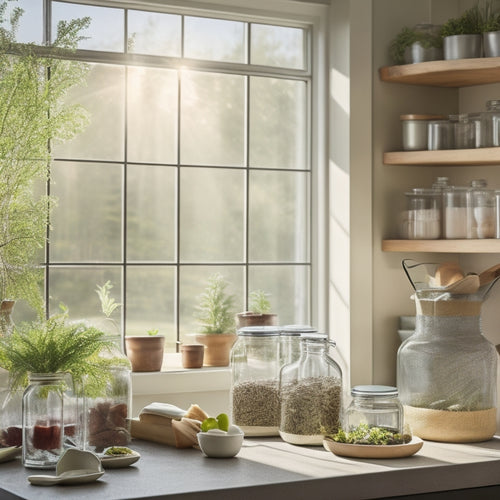
Portable Solar Panels for Home
Share
You're considering portable solar panels for your home, a savvy move towards energy independence and reduced utility bills. A well-designed system can offset up to 100% of your energy needs, offering freedom from grid reliance and control over costs. Essential components include portable solar panels, battery storage, and solar inverters. To get started, evaluate your energy needs and solar array size, and prioritize high-efficiency cells for maximum power output capacity. With a lightweight and durable frame design, you'll be utilizing renewable energy in no time. Now, investigate the specifics of portable solar panels and uncover how they can change your home's energy environment.
The Essentials
- Portable solar panels offer energy independence, reducing reliance on the grid and energy bills, while supporting sustainable living and environmental health.
- Essential components of off-grid systems include portable solar panels, battery storage, and solar inverters to ensure efficient energy generation and storage.
- Portable solar panels can be easily moved and set up in various locations, making them ideal for homes, outdoor activities, and emergency power backup.
- When designing an off-grid system, it's crucial to evaluate energy needs and solar array size to ensure the system meets energy requirements efficiently.
- Well-designed portable solar panel systems can increase property value, attract environmentally conscious buyers, and provide a premium in property pricing.
Energy Independence at Home
You can achieve energy independence at home by utilizing a renewable energy source like solar power, which reduces your reliance on the grid and lowers your energy bills.
By investing in an off-grid solar power system, you can overcome the common pain points of complexity, high upfront costs, and durability concerns.
With portable solar panels, you can investigate off-grid power options, giving you the freedom to generate electricity wherever you need it.
Renewable Energy Source
The shift towards renewable energy sources has become a pressing concern in the current era, where energy independence at home is no longer a luxury, but a necessity.
As you investigate ways to break free from reliance on the grid, you're likely considering the benefits of solar energy. Utilizing the power of the sun can greatly reduce your carbon footprint and lower your energy bills.
By incorporating solar energy into your sustainable living strategy, you'll not only reduce your dependence on fossil fuels but also contribute to a cleaner environment.
Portable solar panels offer a convenient and efficient way to tap into this renewable energy source. You can use them to power your home, charge your devices, or even fuel your outdoor excursions.
When selecting a portable solar panel, consider factors such as efficiency, durability, and weight. Look for panels with high conversion rates, weather-resistant materials, and compact designs.
Off-Grid Power Options
Many homes rely on off-grid power options to achieve energy independence, and portable solar panels are a key component in this expedition. You can capture the sun's energy to power your home, reducing your reliance on the grid.
To go off-grid, you'll need a thorough system that includes portable solar panels, battery storage, and solar inverters. By embracing renewable energy with self-sufficient power solutions Renewable Energy Systems, you can minimize your energy expenses and enjoy uninterrupted power supply.
Portable solar panels convert sunlight into DC power, which is then stored in batteries for later use. Solar inverters convert the DC power into AC power, making it compatible with your home's electrical system.
When designing your off-grid system, you'll need to evaluate your energy needs and the size of your solar panel array. You'll also need to choose the right battery storage solution, considering factors like capacity, depth of discharge, and charging cycles.
With the right components and a well-designed system, you can enjoy the freedom and flexibility of off-grid power. By generating your own clean energy, you'll reduce your reliance on the grid and gain control over your energy costs.
Increases Property Value Fast
By installing portable solar panels, you're not only reducing your energy bills, but you're also investing in a renewable energy system that utilizes the power of photovoltaic cells to generate electricity renewable energy systems.
This not only reduces your carbon footprint but also contributes to a more sustainable future.
You're also enhancing your property's resale appeal. This eco-friendly home upgrade sends a strong signal to potential buyers that your home is modern, efficient, and environmentally conscious.
As a result, you can expect a significant increase in your property's value, making it more attractive to buyers and setting it apart from similar properties in the neighborhood.
Boosts Resale Appeal
Installing portable solar panels can be a savvy investment for homeowners, as they greatly enhance resale appeal and increase property value fast.
When you decide to sell your property, having a portable solar panel system in place can be a major selling point.
In today's resale market, buyers are becoming increasingly environmentally conscious and energy-efficient. As a result, they're willing to pay a premium for homes that already have sustainable features installed.
Eco-Friendly Home Upgrades
Eco-friendly home upgrades, including portable solar panels, can greatly increase your property value fast. By incorporating sustainable materials and energy-efficient features, you can attract potential buyers who share your values and are willing to pay a premium for an environmentally responsible home.
In fact, studies have shown that eco-friendly upgrades can recoup up to 100% of their cost at resale.
When it comes to energy conservation, portable solar panels are an attractive feature. They're a visible demonstration of your commitment to reducing your carbon footprint, and they can provide a significant reduction in energy costs.
Additionally, solar panels can increase your home's energy independence, giving you more control over your energy usage.
High-Efficiency Cells Matter Most
When shopping for portable solar panels, you'll notice that manufacturers tout their products' cell efficiency ratings, which measure how well the cells convert sunlight into electricity.
For instance, high-performance batteries play an essential role in maximizing renewable energy storage and reducing reliance on the grid.
You should prioritize high-efficiency cells because they directly impact the power output capacity of your system. Look for panels with high efficiency ratings, typically above 20%, to maximize your energy generation.
Cell Efficiency Ratings
Your solar panel's cell efficiency rating is a vital metric that directly impacts its performance, as it determines how much electricity it can generate from the same amount of sunlight. This rating is typically measured as a percentage, with higher percentages indicating more efficient energy conversion.
For instance, a solar panel with 20% efficiency can produce 20 units of electricity from 100 units of sunlight, whereas a 15% efficient panel would produce only 15 units.
When comparing solar panels, it's important to evaluate the efficiency of different solar cell types. Monocrystalline silicon cells, for example, are more efficient than polycrystalline silicon cells. The latter, however, are more affordable.
Thin-film solar cells, on the other hand, have lower efficiencies but are more flexible and lightweight. Efficiency comparison is significant, as it directly affects the panel's energy output. A high-efficiency solar panel can generate more power in a smaller area, making it ideal for portable solar panels where space is limited.
Power Output Capacity
Twenty watts of power may not seem like a lot, but it's a significant amount of energy when you're camping in the wilderness or powering your laptop on a road trip.
When choosing a portable solar panel for your home, you need to take into account the power output capacity to guarantee it meets your energy needs. High-efficiency cells matter most in this regard, as they can generate more power per hour of sunlight.
Different solar panel types have varying power output capacities. Monocrystalline panels are the most efficient, followed by polycrystalline and thin-film panels.
When selecting a panel, think about your energy requirements and the amount of sunlight available in your area. Installation considerations, such as the angle and orientation of the panel, also impact the power output.
You should look for a panel with a high wattage rating per square foot to maximize energy generation. Additionally, take into account the panel's voltage and current output to guarantee it's compatible with your devices.
Check Wattage Per Hour
When selecting a portable solar panel for your home, you'll need to take into account the power output rating, which is typically measured in watts (W). This rating indicates how much electricity the panel can produce per hour under ideal conditions.
For instance, integrating renewable energy storage solutions with your portable solar panel can greatly enhance its overall performance.
You'll also need to calculate your daily energy needs to guarantee the panel can meet your requirements, so it's crucial to understand how wattage per hour translates to real-world energy production.
Power Output Rating
A solar panel's power output rating, measured in watts (W), indicates its capacity to generate electricity. When selecting a portable solar panel for your home, it's crucial to take into account the power output rating to guarantee it meets your energy needs.
You'll want to choose a panel that can efficiently generate power, especially if you plan to use it to power appliances or charge batteries.
A higher power output rating doesn't always mean better performance, though. You need to take into account the solar efficiency of the panel, which is the percentage of sunlight converted into electricity.
Look for panels with high solar efficiency rates, typically above 20%, to maximize power generation.
When checking the power output rating, you'll often see it listed as a range, such as 100-200W. This indicates the panel's capacity to generate electricity under ideal conditions.
Keep in mind that real-world conditions, like partial shading or high temperatures, can affect the panel's performance.
Daily Energy Needs
Your daily energy needs play a significant role in determining the right portable solar panel for your home. To calculate your energy consumption, you need to evaluate the wattage per hour of the devices you plan to power.
Make a list of the appliances, lights, and gadgets you want to run on solar power, and note their power ratings in watts. Add up the total wattage to get your total energy consumption per hour.
For example, if you want to power a 20W laptop, a 10W lamp, and a 50W fridge, your total energy consumption would be 80W per hour.
Assess your energy usage patterns, such as peak hours and nighttime usage, to get an accurate estimate. This calculation will help you determine the required capacity of your portable solar panel. A higher energy consumption means you'll need a more powerful solar panel or a larger battery storage capacity for solar integration.
Lightweight Aluminum Frame Design
You'll want to look for a portable solar panel with a durable frame construction that can withstand outdoor elements and handling.
A well-designed aluminum frame should be able to support the weight of the solar panel and its components without sacrificing portability.
A sturdy frame is essential to guarantee your investment lasts for years to come.
Durable Frame Construction
Rugged outdoor environments demand solar panels built to withstand harsh conditions, and that's where sturdy frame construction comes in. You need a frame that can resist corrosion, withstand extreme temperatures, and hold up against harsh weather conditions.
| Frame Materials | Weather Resistance |
|---|---|
| Aluminum | Excellent corrosion resistance, can withstand extreme temperatures |
| Stainless Steel | High corrosion resistance, suitable for coastal or high-humidity areas |
| Anodized Aluminum | Superior corrosion resistance, ideal for extreme outdoor use |
| Powder-Coated Steel | Good corrosion resistance, suitable for moderate outdoor use |
| Fiberglass | Poor corrosion resistance, not recommended for outdoor use |
When choosing a portable solar panel, look for sturdy frame construction that can withstand the elements. Aluminum frames are a popular choice due to their lightweight yet strong design. Additionally, anodized aluminum frames offer superior corrosion resistance, making them ideal for extreme outdoor use. By selecting a solar panel with a durable frame, you can guarantee your investment lasts for years to come, providing you with the freedom to generate clean energy wherever you go.
Frequently Asked Questions
Can Portable Solar Panels Be Used for RVS and Campers?
When you're on the open road, you can use portable solar panels to charge your RV's batteries, providing reliable RV power and camping energy, allowing you to stay off-grid and enjoy the freedom of exploration without worrying about energy constraints.
Do Portable Solar Panels Require Any Maintenance at All?
As you bask in the freedom of renewable energy, you'll find that your portable solar panels require gentle nurturing; regular cleaning techniques will guarantee peak performance, while proper care can extend their lifespan expectations, giving you years of unbridled energy independence.
Can I Use Multiple Portable Solar Panels at Once?
When you're looking to enhance energy efficiency, you can definitely use multiple panels at once, increasing your charging capacity and utilizing more power - just make certain you've got a compatible charging system to handle the extra energy output.
Are Portable Solar Panels Waterproof and Weather-Resistant?
You're wondering if your solar panel can withstand harsh weather conditions. Fortunately, most modern solar panels boast impressive durability, with weather-resistant designs and waterproof coatings to protect them from rain, snow, and extreme temperatures.
Can I Install Portable Solar Panels on My Existing Roof?
You can install portable solar panels on your existing roof, but first, confirm roof compatibility by checking its age, condition, and structural integrity, as this will affect the installation benefits and overall system performance.
Final Thoughts
As you weigh your options for portable solar panels for home, remember that energy independence is within reach. By investing in high-efficiency cells, you'll maximize your energy harvest. Don't overlook the importance of wattage per hour and a lightweight aluminum frame design. With the right system, you'll not only reduce your reliance on the grid but also enhance your property value. The numbers add up: investing in portable solar panels is a smart move for your wallet and the planet.
Related Posts
-

How to Achieve a Zero-Waste Lifestyle for a Greener Tomorrow
To achieve a zero-waste lifestyle, start by adopting the principles of refusing, reducing, reusing, and recycling. Sw...
-

Solar Powered Lights for Sustainable Home Decor
Solar-powered lights offer a stylish and eco-friendly way to enhance your home decor. They capture sunlight, converti...
-

Smart Grid Technology Implementation Challenges
You'll encounter several challenges when implementing smart grid technology, particularly in cost management, scalabi...


